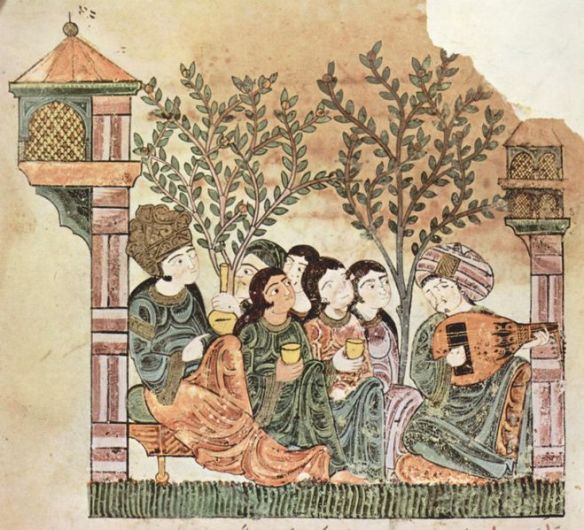‘Iraqi

Translation:
I have seen that the lane of piety stretches out,
far, far into the distance;
My dearest friends, can you not show me then
the way of the madman?
Bring me a glass of Magian wine
that I may drink deep
for I have given up all thought
of ascetic piety;
or if the pure wine has all been downed
bring me the cloudy dregs
for thick residue lights up the heart
and illuminates the eyes.
Tuppence for the Sufi meeting house!
I flee the company of the righteous;
fill up a row of glasses with wine
and bring me the first.
I have no rules or regulations,
nor heart nor religion –
only I remain, and you, sitting in the corner
and the wealth of Poverty.
All fear of God, all self-denial I deny;
bring wine, nothing but wine
for in all sincerity I repent
my worship which is but hypocrisy.
Yes, bring me wine, for I have renounced all renunciation
and all my vaunted self-righteousness
seems to me but swagger and self-display.
Now for a time let my proof be wine
against the sorrow of Time
for only in drunkenness can one be free
of the hour’s grief.
Once I am thoroughly drunk, what difference
if I end up in a church or in Mecca?
Once I’ve abandoned myself, what matter
if I win Union – or separation?
I’ve been to the gambling house and seen
that the losers there are pure;
I’ve been to the monastery and have found
no one but hypocrites.
Now I’ve broken my repentance, at least
do not break our covenant:
at least welcome this broken heart and say
“How are you? Where have you been?”
I’ve been to Mecca, to circle the Kaaba
but they refused me entrance
saying “Off with you! What merit have you earned
outside, that we should admit you within?”
Then, last night, I knocked
at the tavern door;
from within came a voice: “‘Iraqi! Come in!
for you are one of the chosen!”
from the introduction to Divine Flashes
translation by William Chittick and Peter Wilson
Original:
پسرا، ره قلندر سزد ار به من نمایی
که دراز و دور دیدم ره زهد و پارسایی
پسرا، می مغانه دهی ار حریف مایی
که نماند بیش ما را سر زهد و پارسایی
قدحی می مغانه به من آر، تا بنوشم
که دگر نماند ما را سر توبهٔ ریایی
می صاف اگر نباشد، به من آر درد تیره
که ز درد تیره یابد دل و دیده روشنایی
کم خانقه گرفتم، سر مصلحی ندارم
قدح شراب پر کن، به من آر، چند پایی؟
نه ره و نه رسم دارم، نه دل و نه دین، نه دنیی
منم و حریف و کنجی و نوای بینوایی
نیم اهل زهد و توبه به من آر ساغر می
که به صدق توبه کردم ز عبادت ریایی
تو مرا شراب در ده، که ز زهد تو به کردم
ز صلاح چون ندیدم جز لاف و خودنمایی
ز غم زمانه ما را برهان ز می زمانی
که نیافت جز به می کس ز غم زمان رهایی
چو ز باده مست گشتم، چه کلیسیا، چه کعبه؟
چو به ترک خود بگفتم، چه وصال و چه جدایی؟
به قمارخانه رفتم همه پاکباز دیدم
چو به صومعه رسیدم همه یافتم دغایی
چو شکست توبهٔ من، مشکن تو عهد، باری
به من شکسته دل گو که: چگونهای؟ کجایی؟
به طواف کعبه رفتم به حرم رهم ندادند
که برون در چه کردی، که درون خانه آیی؟
در دیر میزدم من، ز درون صدا بر آمدکه: درآی،
ای عراقی، که تو خود حریف مایی

Shushtari
Translation:
We come to you in poverty, not riches, for you are the generous one.
You accustomed us to every grace, may your grace endure.
These poor disheveled souls of yours are drenched
in your love, because it is the utmost of desires.
There is no one in richness like you
and in poverty there are none like us.
We see you manifest in everything; nothing is ours.
I hid your name out of jealousy. Look at me, lost on a mountain trail and a slope.
Since you are always with me,
I have no need to carry provisions: I am rich.
For you, you are the truth, there is no other
and I – would that I knew – who am I?
From Alvarez, L.M. Abū al-Ḥasan al-Shushtarī: Songs of Love and Devotion, (New York, Paulist Press, 2009), p. 69

Original:
أتيناك بالفقر لا بالغنى وأنت الذي لم تزل محسنّا
وعوّدتنا كلّ فضل عسى يدوم الذي منك عوّدتنا
مسا كينك الشعث قد موهوا بحبك إذ هو أقصى المنى
فما في الغنى واحد مثلكم و في الفقر لا عصبة مثلنا
رأيناك في كلّ أمر بدا وليس من الأمر شيء لنا
سترت اسمكم غيرة ها أنا أموه بالشعب والمنحنى
إذا كنت في كلّ حال معي فعن حمل زادي أنا في غنى
فأنتم هم الحق لا غيركم فياليت شعري أنا من أنا

Related






Beautiful! Absolutely beautiful!